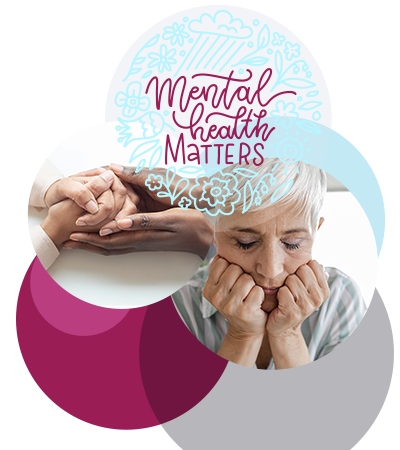Maternal Mental Health
Caring for your mental health is important during pregnancy and after giving birth. Many pregnant people and new parents experience anxiety and sadness during and after pregnancy. Sometimes called the “baby blues,” these feelings are normal and begin during the first two to three days after delivery, often passing within 10 days. Symptoms include brief moments of crying, irritability, poor sleep, nervousness and intense emotions. Baby blues does not include thoughts of harming yourself.
If these feelings are present most of the day and last for more than two weeks, it could be a sign of postpartum depression. This can affect people of all cultures, ages and races. In fact, about one in eight people who give birth experience postpartum depression. Additionally, people who have depression symptoms during pregnancy, a history of major depressive disorder, or a previous diagnosis of postpartum depression are at increased risk of postpartum depression.
It’s important to pay attention to changes in your body and mood during and after pregnancy. Talk to your primary care provider (PCP) or prenatal provider about how you are feeling and any changes you are noticing. The good news is that there are many resources to support new parents mentally and emotionally.
Symptoms of maternal mental and emotional health issues
Pregnant people and new parents may have symptoms of common disorders such as depression and anxiety. The symptoms of postpartum depression are like those for depression, but may also include:
- Crying more often than usual
- Spending less time with loved ones
- Feeling numb or disconnected from your baby
- Worrying that you will hurt the baby
- Feeling guilty about not being a good mom or doubting your ability to care for the baby
Learn more about the common symptoms of postpartum depression.
Types of maternal mental and emotional health issues
Changes in hormones (body chemicals that affect the body) during and after pregnancy can lead to major changes in mood, sleep patterns and emotions. While the “Baby Blues,” as they are sometimes called, can pass quickly and without too much concern, some new parents experience longer-lasting or more serious forms of depression.
There are different types of depression and other mental health conditions that can occur during and/or after pregnancy. To learn more, visit the Mental Health America website.
Treatment for postpartum depression
Postpartum depression and other mental health conditions in pregnancy often go undiagnosed and untreated. Treatment is important for you and your baby. If postpartum depression is not treated, it can lead to poor parent-baby bonding, slow down baby’s growth and development, and increase the baby’s risk for anxiety and depression later in life.
It’s important to talk to your primary care provider (PCP) about your symptoms and options for treatment, such as therapy and/or medications.
Maternal mental health resources
Pregnancy and having a baby can cause changes to your body and your lifestyle. This can impact your mental state.
If you or a loved one is struggling emotionally while pregnant or after the birth of a child, talk to your PCP about how you are feeling. They may have recommendations to help you feel better. Or, to be connected with a mental health provider, call the Behavioral Health and Recovery Services (BHRS) ACCESS Call Center at 1-800-686-0101. TDD users call 1-800-943-2833. If your call isn’t answered live, please leave a message with your name and call-back number, and someone from BHRS will return your call.
If you are pregnant or recently gave birth, you have access to up to 20 preventative mental health visits. You can connect with care even if you don’t have any mental health symptoms. Mental health care can help you cope with changes that come from being a new parent. It can also help prevent or support you with mental health symptoms that can commonly occur during and after pregnancy.
Along with therapy, local resources for pregnant people and new parents can support your mental and physical health. These include getting ready for giving birth, new parent training, healthy eating, exercise and more.
HPSM resources
Staying healthy during pregnancy helps your baby be healthy. HPSM provides information about exercise, healthy eating and other ways to take good care of yourself during pregnancy.
You may also be able to join HPSM’s Baby + Me program. Baby + Me supports the health of pregnant people, new parents and their babies.
Grief support and hotlines
Hotlines are available to connect with a trained staff members who can provide support and resources when someone has an urgent mental health concern.
- All Options Talkline – supports those who want to talk about a past or current experience with abortion, pregnancy loss, infertility or parenting, or who are unsure how to feel or what to do next.
- Call 1-888-493-0092
- Available in English and Spanish
- Hand of the Bay Area – Offers peer support to parents and loved ones who are grieving the loss of a baby before, during
or after birth.
- Call 650-367-6993
- Available in English and Spanish
- National Maternal Mental Health Hotline – Trained counselors
are available 24/7 for those who are pregnant or recently delivered and are seeking support.
- Call or text 1-833-852-6262
- Available in English and Spanish
Find out how to get mental health care, learn about common mental health issues and find self-help resources
How to find out if you need help
Talk to your health care provider about how you are feeling. They may have recommendations to help you feel better. You can also call the Behavioral Health and Recovery Services (BHRS) ACCESS Call Center at 1-800-686-0101. TDD users call 1-800-943-2833. If your call isn’t answered live, please leave a message with your name and call-back number, and someone from BHRS will return your call.
You can also contact no-cost mental health support hotlines that are open 24 hours a day, 7 days a week. You can call them any time.
